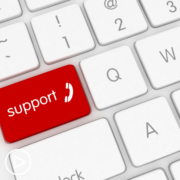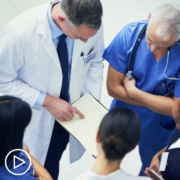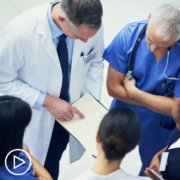How Can You Insist on Better Prostate Cancer Care?
How Can You Insist on Better Prostate Cancer Care? from Patient Empowerment Network on Vimeo.
How can prostate cancer patients access the best care in an evolving treatment landscape? Prostate cancer survivor Jim Schraidt shares his advice for staying up-to-date about treatment developments and for accessing support and resources
Jim Schraidt is a prostate cancer survivor and Chairman of the Board of Directors for Us TOO International. Learn more about Jim Schraidt here.
See More From INSIST! Prostate Cancer
Related Resources
Transcript:
Jim Schraidt:
The really great news is that sort of across the board, from early stage disease through metastatic prostate cancer patients, there are advances that are occurring very rapidly at this point, so rapidly that practitioners have difficulty keeping up with them.
And, honestly, those of us who do some patients support likewise have difficulty keeping up with them. I think, once again, these support groups can serve a useful function in that you have specific questions, you hear about it, you bring together a group of individuals, and somebody in that group may know something about it.
And they can tell you, they can give you information, or they can give you direct Internet links where you can find more information. The other source of information is some of the Us TOO publications, our monthly hot sheet, as well as the website.
There are a couple other websites that I personally regard as excellent. The first would be the Prostate Cancer Foundation. The second would be Prostate Cancer Research Institute. And then finally, ZERO. So, I think if you attend a support group, and talk to other guys, and look at some of these websites, I think that’s a very good starting point for research and trying to get the best and most up-to-date information possible.
There’s a lot of progress being made across the disease spectrum, and it’s very exciting. I mean, for many years, all we had was surgery, radiation, and hormone therapy. But new things are coming online all the time. There are immunotherapies that are frequently genetically based. And there’s new knowledge about the disease itself and making active surveillance available to more patients.
And this is extremely critical because many men can go on with prostate cancer, with low-grade disease, really for their entire lives, and avoid the side effects of treatment.
And even if they don’t, if they delay definitive treatment for a period of years, there may be something new that comes down the pike that is both effective and has a better side-effect profile. This is the kind of research that is a part of what Prostate Cancer Foundation is funding.
So, there’s a lot out there. There’s a lot that’s happening. And I think that should give encouragement to prostate cancer patients. In terms of somebody who is later in the process and having difficulty coping with side effects or disease progression, I think the encouragement is that there are people out there that you can talk to about it, that you’re really not alone, and there are people out there that are anxious to help you, to hear from you, and provide assistance.
For those of us who have been at it a while, we find that helping others enhances our own healing. And so, don’t be reticent about asking for help. Because it’s out there, and it can really make a difference.








